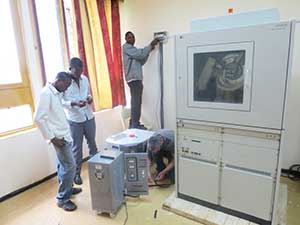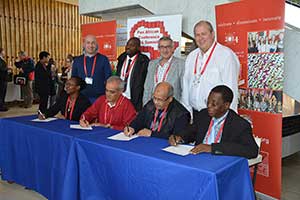The Contribution of the IUCr to the Development of Scientific Education, Research and Infrastructure in Africa
Michele Zema
The International Union of Crystallography (IUCr) is a scientific union adhering to the International Council for Science (ICSU). Its objectives are to promote international cooperation in crystallography and to contribute to all aspects of crystallography, to promote international publication of crystallographic research, to facilitate standardization of methods, units, nomenclature and symbols, and to form a focus for the relations of crystallography to other sciences. The IUCr fulfils these objectives by publishing primary scientific journals, the series of reference volumes International Tables for Crystallography, distributing the quarterly IUCr Newsletter, maintaining the online World Directory of Crystallographers, awarding the Ewald Prize and organising the triennial Congress and General Assembly. In addition, the IUCr supports numerous crystallographic activities and events through its sponsorship schemes, and carries out a wide programme of outreach activities aimed at improving public awareness of the field, allowing access to instrumentation and high-level research, nurturing “home-grown” crystallographers in developing nations, and increasing international collaborations for the benefit of future generations.
An important boost to the IUCr educational and outreach programme was given by the International Year of Crystallography 2014 (IYCr2014). The IUCr and UNESCO received a strong mandate from the UN to coordinate the activities of the International Year. In their resolution, the United Nations General Assembly recognized that “humankind’s understanding of the material nature of our world is grounded, in particular, in our knowledge of crystallography”, and stressed that “education about and the application of crystallography are critical in addressing fundamental challenges”. At a time when scientific endeavour is critical for societal benefit and despite the immensely powerful scientific influence of crystallography over the past century, this discipline is rarely a priority of governments and is scarcely known by the public. Understanding the structure of matter and relating this to the properties and functionality of any kind of compound has provided new paths for scientific research, has transformed industries and created new frontiers, from the design of new medicines and materials to assessing the mineral content of Mars. The future global economy will be determined by progress in cutting-edge fields. However, the playing field is not level in crystallography, and fundamental courses on crystallography are disappearing from most academic degree curricula and are almost absent in the developing countries.
Consequently, several activities are conducted by the IUCr to promote crystallography and science in general in the developing regions. Among these, the IUCr Crystallography in Africa initiative was launched in 1999, following an idea of J.C.A. Boeyens. The initiative is presently coordinated by C. Lecomte (U. Lorraine, Nancy, France). The programme not only trains teaching staff and PhD students in crystallography but also provides participating universities with instrumentation (thanks to the partnership with some private companies) in order to enable them to conduct independent research. Many countries have been targeted, including South Africa, Morocco, Tunisia, Algeria, Cameroon, Senegal, Cote d’Ivoire, and others, such as Gabon, Kenya, Zambia, Madagascar, Burkina Faso and Benin are in the pipeline. In 2012, a diffractometer was installed at the University of Dschang, Cameroon, and the faculty staff and students were trained. In October 2016, the same University will host the 1st Panafrican Conference on Crystallography, a major achievement for the development of a scientific community in the region. As part of the activities for IYCr2014, a Summit meeting was organized in Bloemfontein (South Africa), which offered an opportunity for African crystallographers, scientists, science administrators, policy-makers and industry leaders to discuss the challenges that this science is facing in the African continent. This led to the IUCr-ICSU "Building Science Capacity in Africa via Crystallography" initiative, funded by an ICSU grant in 2015, which is addressing some of the issues highlighted at that meeting. More recently, the IUCr has enthusiastically accepted the invitation from IUPAP to take part in the programme and activities for the African Light Source. Such a project, although still very preliminary, is already contributing to the formation of a community of African scientists, as demonstrated by the very successful launch meeting held in Grenoble in November 2015.
The African scientific community is also one of the targets of the IUCr-UNESCO OpenLab initiative, a network of operational crystallographic laboratories, organized in partnership with industry, which is enabling students in far-flung lands to have hands-on training in modern techniques and exposure to cutting-edge research in the field. The aim of the OpenLabs is to make science more broad-based and energize youth in parts of the world that have remained underdeveloped for too long.
Similar programmes are being developed by the IUCr in other regions, like South-East Asia and Latin America. The IUCr is willing to collaborate and share efforts with any other scientific society or educational institution to develop a programme aimed at reducing the science capacity gap between the wealthiest and the poorest regions of the world by increasing the linkage between science policy and the regional scientific communities, and by fostering international scientific cooperation. A dedicated IUCr Outreach and Education Fund has been established for this purpose and individuals, institutions and companies are invited to donate to help achieve these aims.

Installing the diffractometer at the University of Dschang, Cameroon

Signing the final declaration at the IYCr2014 Pan African and South African Summit meeting (Bloemfontein, October 2014). Seated at table (from left): Patricia W. Gitari (Kenya), Habib Boughzala (Tunisia), Abdelmalek Thalal (Morocco), Zephirin Yav (DR Congo). Standing: Michele Zema (IUCr; Italy), Jean Paul Ngome-Abiaga (UNESCO; Gabon), Santiago García-Granda (IUCr; Spain), Andreas Roodt (South Africa; organizer of the Summit meeting)
Dr Michele Zema is a researcher and lecturer in Mineralogy and Crystallography at the University of Pavia, Italy and Outreach Officer at the International Union of Crystallography. He has served as Project Manager for the UN International Year of Crystallography 2014. His research activity deals mainly with the structural behaviour of solid solutions of inorganic materials at different conditions of temperature and pressure. Michele Zema is actively engaged in a number of educational and outreach programmes, from primary school to postdoc levels, which are also aimed at nurturing scientific activities in the developing countries.
